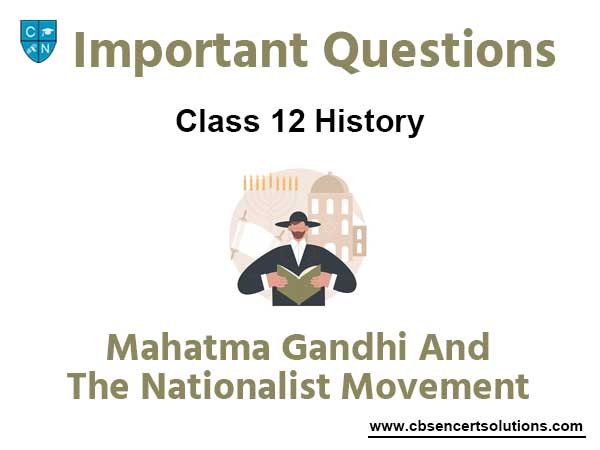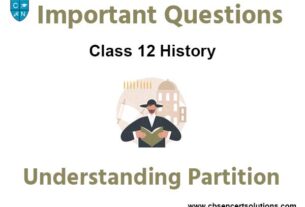Please refer to Mahatma Gandhi and The Nationalist Movement Class 12 History Important Questions given below. These solved questions for Mahatma Gandhi and The Nationalist Movement have been prepared based on the latest CBSE, NCERT and KVS syllabus and books issued for the current academic year. We have provided important examination questions for Class 12 History all chapters.
Class 12 History Mahatma Gandhi and The Nationalist Movement
Very Short Answer Questions :
Question. Why was the Khilafat Movement started?
Ans. 1. To protest against the injustice done to Turkey.
2. To retain the Turkish Sultan or Khilafat.
Question. What was the attitude of the Indian National Congress towards the second world war?
Ans. Both Mahatma Gandhi and Nehru were against Hitler and Nazis.
Question. What was the Rowlatt Act?
Ans. This act Passed in 1919 for two years permitted the detention of any person without trial in the court.
Question. Why did Mahatma Gandhi consider the salt tax more oppressive than other taxes?
Ans. Salt tax was wickedly designed by the Government. Salt was used in every household.
Question. What is the importance of the Salt March?
Ans. This event brought Mahatma Gandhi to world attention.
Question. What is meant by Rowlatt Act?
Ans. Anybody could be arrested on the basis of suspicion and put in prison without trial.
Question. Why was the Non- co-operation Movement launched?
Ans. 1.To protest against the Jallianwalla Bagh and the Khilafat wrongs.
2. To demand swaraj.
Short Answer Questions :
Question. Why did Gandhiji Start Non Cooperation Movement? Why was it withdrawn?
Ans. 1.To oppose ‘Rowlett Act’.
2. To undo the injustice done at Jalianwala Bagh.
3. To support the Khilafat Movement.
4. To get Swaraj
5. Violence at Chauri-Chaura and movement withdrawn.
Question. Why did Gandhiji start Non-cooperation Movement? Why was it withdrawn?
Ans. To oppose Rowlatt Act.
– To undo the injustice done at Jalianwala Bagh.
– To support the Khilafat Movement.
– To attend Swaraj.
– Violence at Chauri-Chaura-He withdrew non co-operation movement because of the incident of Chauri-Chaura
– Gandhiji believed in non-violence.
Long Answer Questions :
Question. What was the aim and methods of Non Co-operation Movements?
Ans. 1. Protest against Jallianwala Bagh Massacre.
2. Demand of Swaraj.
3. To Support Khilafat Movement.
4. Hindu Muslim Unity.
5. To oppose Rowlett Act.
Methods –
1. Surrender of the titles
2. Movement should be non-violent.
3. No co-operation with British Government.
4. Bycott of court and offices, college, foreign cloths etc.
5. Strikes and demonstration.
Question. In what way did Mahatma Gandhi transform the nature of the National Movement?
Ans. 1. Gandhiji had concern for the poor.
2. BHU/Champaran/Ahamedabad/Kheda issue.
3. He launched Non Co-operation, Civil Disobedience, Salt March and Quit India Movement and thousands of Indians of all classes joined these movements.
4. Inspirational leadership of Gandhiji.
5. Gandhiji’s ideology
6. In the Satyagraha masses were involved.
7. Constructive Programs of Gandhiji.
8. By his political Methods.
9. Gandhiji’s Charisma.
1915 Gandhiji Returned India from South Africa
Feb. 1916 Gandhi’s Speech at Banaras
1917 Champaran Campaigns
1918 Ahmedabad, Kheda Campaigns
March 1919 Rowlett Act Passed
April 1919 Jalianwala Bagh Massacre
1920-21 The Khilafat and Non Co-operation Movement
Feb. 1922 Chauri-Chaura and withdrawal of Non Co-operation movement.
Dec. 1929 Lahore Session of Congress
March 1930- Salt March
Jan. 1931- Gandhi-Irwin Pact
1935- Government of India Act.
1942- Quit India Movement
1946- Cabinet Mission
15 Aug. 1947- India got freedom
30 Jan. 1948 Gandhi was shot dead by a Nathuram Godse.
Question. How did Gandhiji transform National Movement into mass movement?
Ans. 1. Simple lifestyle
2. Use of Hindi for communication
3. Role of Gandhiji in three mass movements.
4. Emphasis on Truth and non-violence
5. Swadeshi, boycott and Swaraj.
6. Importance on Charkha and Khadi.
7. Upliftment of women, poor downtrodden.
8. Hindu-Muslim unity
9. Abolition of untouchability.
10. Balancing each and every section of society.

